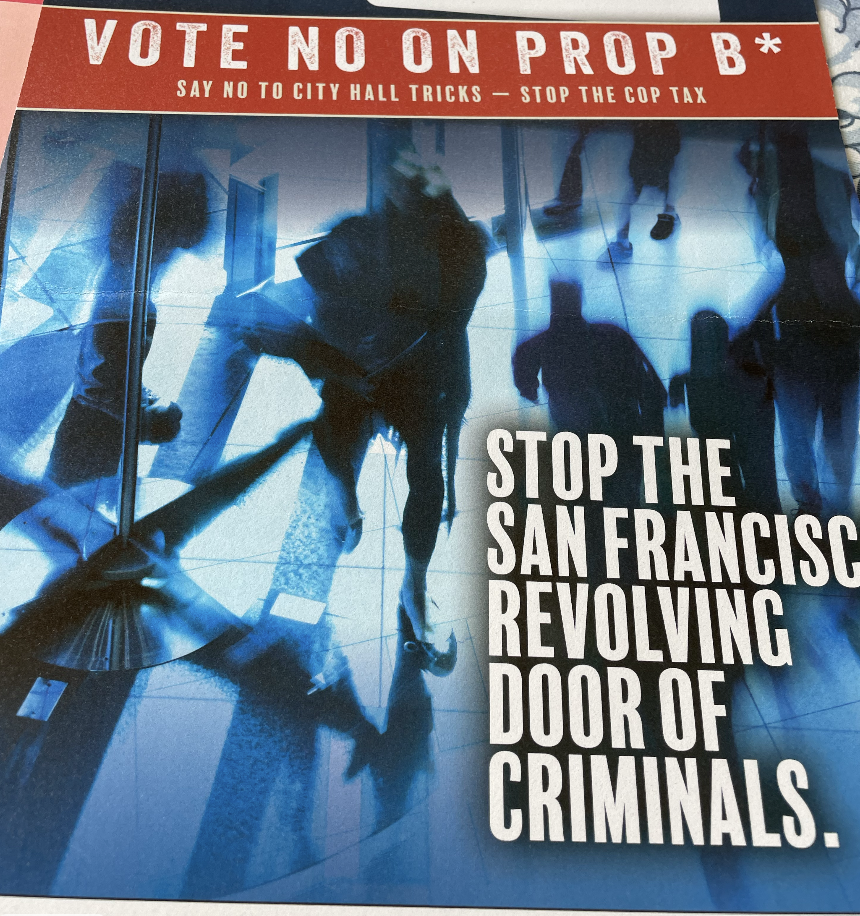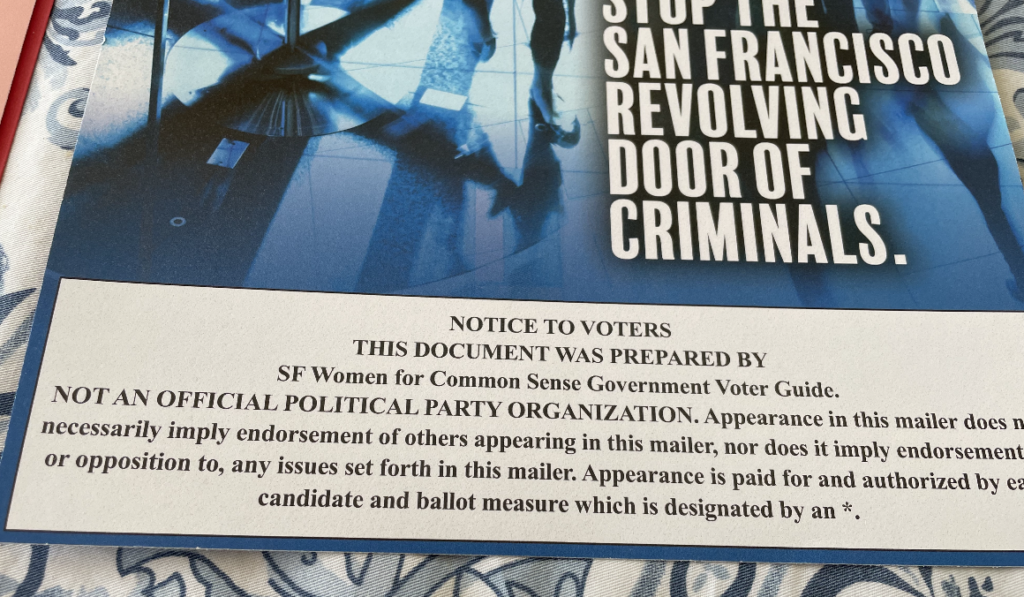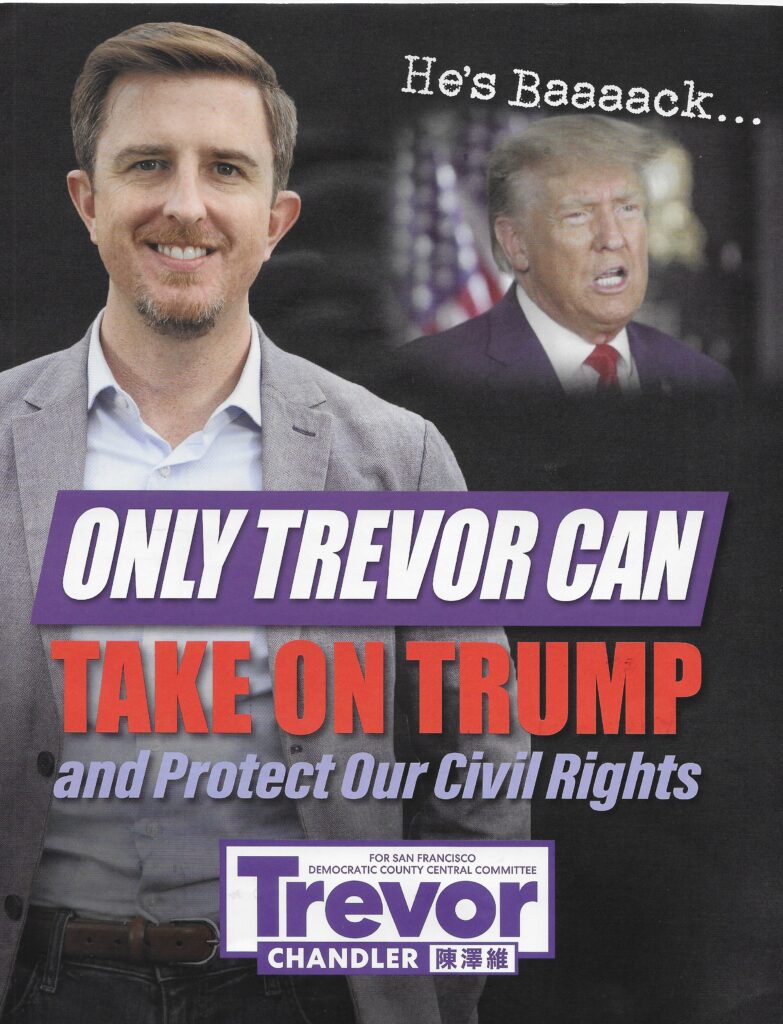It’s getting hard even for political data nerds to keep track of the dizzying array of billionaire-funded organizations that are sending money back and forth to each other, some of them filing as state committees and some as local committees, and then funneling it into candidates for the local Democratic County Central Committee.
Huge sums of money are going into Mayor London Breed’s ballot measures, that attack poor people and seek to give the cops far more leeway to spy on us all and run high-speed chases through the narrow streets of the city’s neighborhoods.
It’s weird, since those ballot measures are polling at such high levels—and other than the ACLU opposing Prop. E, there’s little in the way of well-funded campaigns against them—that it’s hard to wonder if that $500,000 dollars or so might be better used for other purposes.
Except, of course, that like Gavin Newsom before her, Breed thinks that being mean to poor people will boost her chances of remaining in the Mayor’s Office—and so far, all of the expensive mailers endorsing Props. E and F feature her face and message prominently.
So one could argue that the tech billionaires are actually using the legal loophole of unlimited donations to ballot measures as a way to support Breed.
But back to the web of influence: The newest organization on the block is called “SF Women for Common Sense.” It’s so new that the organization hasn’t even filed its initial fundraising reports with the Secretary of State’s Office.
But its slate mailer reports show that its first mailer was funded, to the tune of $40,000, by Neighbors for a Better San Francisco, a group funded in part Bill Oberndorf, who also gives a lot of money to the GOP.


The attack mailer goes after two incumbent judges with messaging that has already been proven at best misleading. It attacks the judges for doing what state law requires them to do—release people awaiting trial unless they are a violent threat to society. Under state law, dealing drugs at a small-time street level doesn’t make someone a violent threat.
Also: Most veteran court observers I have spoken to, including criminal defense lawyers and former judges, agree that there is no way either of the two challengers will ever be able to handle criminal cases; they’d be forced out on simple challenges for prejudice every time.
The mailer also supports Sup. Matt Dorsey, who has become a strong ally of the cops.
Then we have this remarkable piece of campaign literature, which will go down in the record books of the annals of astonishing hype and overstatement.

Trevor Chandler, who has never held elective office and whose political experience consists largely of working as a lobbyist for AIPAC, is the “only” person in San Francisco—or maybe the entire world—who can take on Donald Trump?
I suspect that some other San Franciscans, including the vice president of the United States and the former speaker of the House, might disagree.
The mailer appears to have been funded at least in part by “Families for a Vibrant SF,” the same network of billionaires. The group received $250,000 from Chris Larsen and $100,000 from Emmet Shear, a “visiting group partner” at Y combinator, which is run by a guy whose late-night tweets have led to death threats against San Francisco supervisors.
In his DCCC mailer, he says he wants to “restore San Francisco as a progressive beacon for the nation.”
The word “progressive” has a rich history and, today, I believe, a real meaning. Progressives care about economic inequality, don’t believe the free market solves our most pressing problems, and by my definition, support changes in tax law that would require the very rich to pay a lot more. Progressives pay attention to this.
It’s highly unlikely that anyone who is actually a “progressive” would get money from the tech billionaires or be endorsed by the likes of GrowSF. (The word “conservative” used to mean something, too, before the Fox News and Trump/MAGA crowd co-opted it.) Folks like Chandler prefer “moderate,” which doesn’t mean anything either. When it comes to economic and housing policy, the most accurate term for this camp is “neoliberal,” which refers to people who believe that the “free market” is the best solution to most social and economic problems.
This is, of course, the start of the Trevor Chandler for Supervisor campaign. All of that is perfectly legal: Lots of folks have run for DCCC, where contributions are controlled by state law and unlimited, and then used the momentum to run for supervisor.
But let’s be serious here: Nobody puts up the kind of money it takes for a district-wide mailer for DCCC unless there’s a larger agenda.
Breed’s entire re-election campaign at this point seems to be promoting ballot measures that demonize the poor and promote the cops. I suppose that’s a strategy.
Meanwhile, Daniel Lurie, who has never held elective office and has no track record of voting on tough issues, is in full-on campaign mode. He’s got billboards. He’s got tons of digital ads. And there’s an Independent Expenditure Campaign supporting him that’s already sent out a very slick, expensive mailer.
The IE is called “Believe in SF Lurie for Mayor 2024,” and the biggest donor, who has put up $1 million, is Mimi Haas—who happens to be Lurie’s mother.
The law allows for IE’s to raise and spend unlimited money—as long as they have no connection to, and are not in any way coordinated with, the candidate.
So we have to accept that Lurie is running for mayor and never, ever, talks to his mother about the campaign or its strategy. Maybe.
The San Francisco Democratic Party endorsements are not what Mayor Breed would like. The party backs both incumbent judges (Breed has taken no position, but her allies clearly want to intimidate the judiciary since they have nobody else to blame at this point for crime.) The DCCC also opposes Props. C, E, and F, which are lynchpins of the mayor’s agenda and re-election campaign.
That’s why the billionaires want to take over the party. In the March primary, the DCCC will have a lot of influence. In the November general, when probably 100,000 voters who pay little attention to local politics will show up to vote against Trump, the Democratic Party endorsements will have a huge impact.
And Breed’s allies want to be sure the balance of power shifts, and she gets that nod.
The San Francisco Business Times is out with its “power 100” list of the most important “movers and shakers” in the Bay Area. Editor Jim Gardner describes it this way:
The 2024 version of the Power 100 [is] our subjective view of who is making things happen in Bay Area business (In other words, no elected officials or government employees.)
This is not a breakdown of people abusing wealth and power; every profile is positive, if not fawning. Many of the names are pretty predictable.
On the other hand, there’s Garry Tan. Yeah, the guy who called for six city officials to “die slow,” which spurred actual death threats.
The paper says:
A perch atop vaunted tech accelerator Y Combinator gives Tan clout — and no hesitation about using it. The combative entrepreneur has plunged feetfirst into S.F. politics, putting his money, A-list connections and huge social media following in service of an increasingly sharp-elbowed battle against progressives.
It does acknowledge the problem:
Tan apologized for a since deleted post which beseeched several San Francisco supervisors to “die slow,” spawning police reports and calls for beneficiaries to refund his largess.
But that’s an afterthought.
Appearing on this list is a social and business perk; everyone on the list wants to be there, and they’re all proud of it, and take it as evidence that the BizTimes thinks they are wonderful.
There are many, many folks who are eligible for the list. All this does is give more credibility to a guy who has no business operating in SF political society any more.






